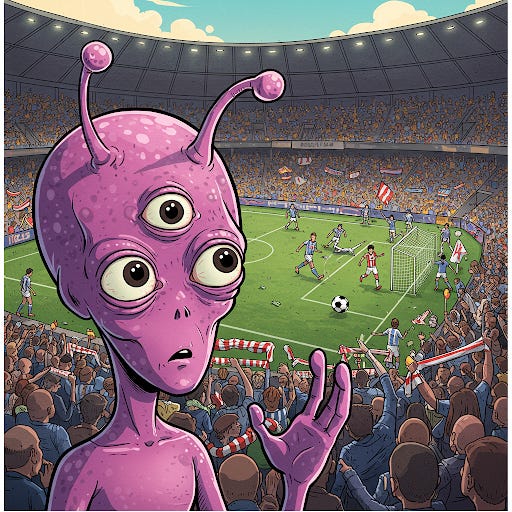The Alien's Guide to Earth: Episode 1 - The Curious Case of the Inflatable Orb (or, How Twenty-Two Humans Chase a Bag of Air for Global Glory).
An intergalactic correspondent's report on a baffling Earth custom.
Greetings, fellow sentient beings! I've just landed on your fascinating, if somewhat perplexing, planet. My mission: to understand your customs. My first observation: a ritual you call "football." Or, as I've come to think of it, "the highly lucrative, globally televised ballet of blokes booting a bladder of nothingness across a meticulously manicured lawn."
Imagine my initial confusion. Grown adults, often possessing the kind of physical prowess that could surely be applied to more… tangible pursuits, dedicating their lives to the exquisite art of propelling a spherical void from one designated area to another. And for this, they are rewarded with sums of money that could comfortably fund small nations. It's a spectacle of inflated egos matched only by the inflated value placed upon their fleeting moments of foot-to-leather contact.
The futility of it is striking. The ball is kicked, chased, passed, intercepted, and ultimately, the game concludes, only for the entire ritual to begin anew. The bag of air remains stubbornly just that – a bag of air – no matter how many spectacular volleys or gravity-defying headers it endures.
This "simple game," as you call it, has morphed into a colossal financial ecosystem, a dizzying vortex of transfer fees that could solve world hunger (if only!), sponsorship deals that plaster every available surface, and broadcasting rights that dictate the very rhythm of your weekends. The beautiful game, it seems, has become inextricably linked with the cold, hard calculus of stocks and shares, a commodity traded with the same fervour as precious metals. The passion of the fans, while seemingly pure, fuels this multi-billion-pound industry, a fascinating symbiosis of emotion and economics.
The Primal Roar: A Lesson in Earthling Psychology
But the absurdity doesn't end there. Why does this "kicking of a bag of air" ignite such… passion? Such… violence? How does a simple pastime morph into tribalistic fury, resulting in clashes between supporters, sometimes with devastating consequences?
The psychology, I'm told, is complex. Football, for many Earthlings, transcends mere entertainment; it becomes an integral part of their identity. The team they support represents their town, their community, a shared history and set of values? This creates a powerful sense of belonging and collective identity. When "their" team is threatened (by the opposition scoring, for example), it can feel like a personal affront, an attack on their very sense of self.
Furthermore, the anonymity of the crowd can embolden individuals to act in ways they might not otherwise consider. The collective energy, the shared passion (or aggression), can create a mob mentality, where individual responsibility diminishes, and the primal urge to defend "the tribe" takes over.
The drama inherent in the game – the tension, the near misses, the elation of a goal, the agony of defeat – also plays a significant role. These heightened emotional states can spill over into aggression, particularly when fueled by… a substance you call "alcohol." The opposing team and their supporters become the "other," the enemy in this carefully constructed sporting narrative.
The Chomsky Conjecture: A Planetary Distraction?
And then, there's the philosophical angle. One of your thinkers, Noam Chomsky, posits that sports, including football, function as a diversion, siphoning public attention from crucial social and political matters, thereby bolstering the status quo for the powerful. He critiques the capacity of sports to cultivate irrational jingoism and uncritical submission to authority, fostering passive consumption rather than active engagement. In his view, the intense focus on sports can "dull people's brains," diminishing their ability to think critically and participate in meaningful discussions, while simultaneously training individuals in conformity and obedience to group dynamics over independent thought.
Is football, then, a grand distraction? A carefully orchestrated spectacle to keep the masses… entertained? Perhaps. Or perhaps it's simply a reflection of your innate need for belonging, your capacity for tribalism, and the potent influence of collective identity.
So, while the spectacle of twenty-two individuals chasing a bag of air might indeed seem futile on the surface, the layers of economic power and psychological intensity it has accumulated are anything but. It's a fascinating, if sometimes troubling, reflection of your modern world, a world where the simple act of kicking a bag of air can become a multi-billion-pound industry and a catalyst for both breathtaking joy and regrettable violence.
Stay tuned for my next report, where I attempt to decipher the mysteries of… "reality television."



